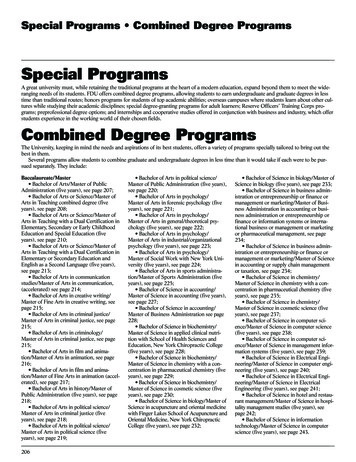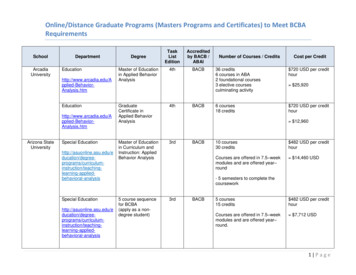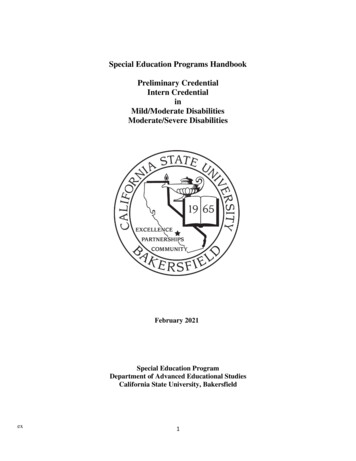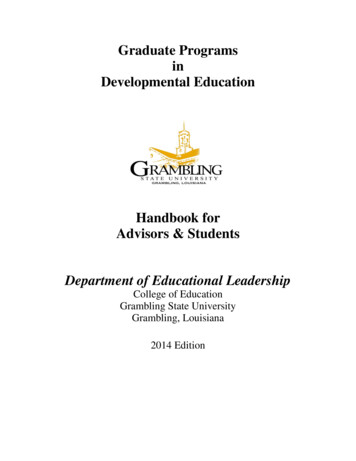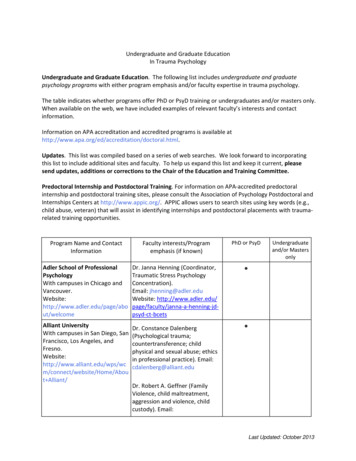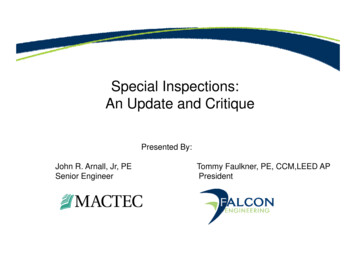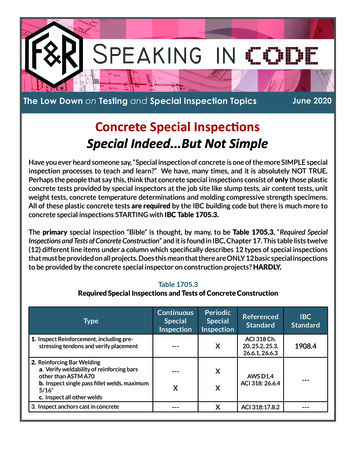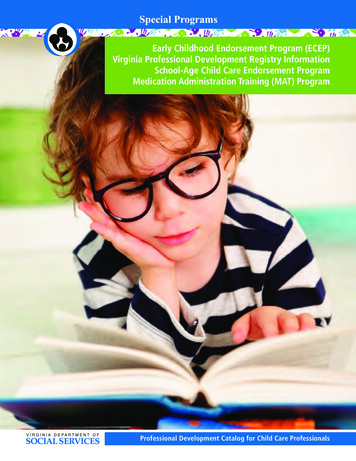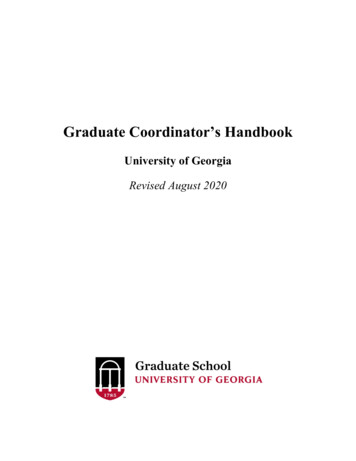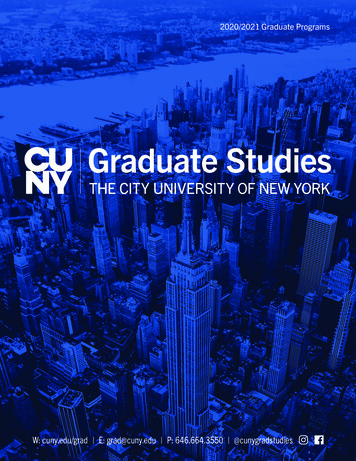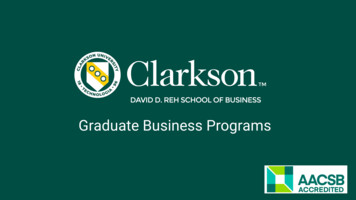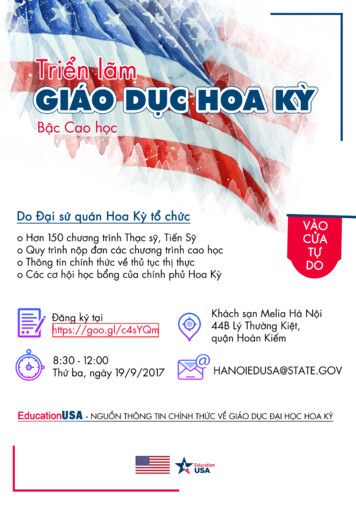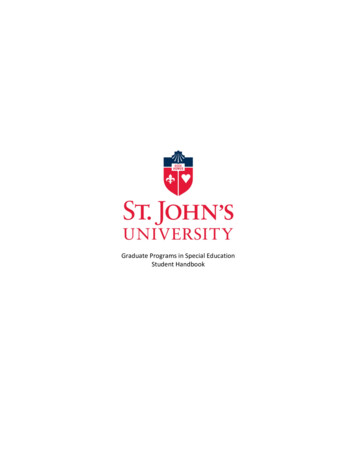
Transcription
Graduate Programs in Special EducationStudent Handbook
TABLE OF CONTENTSA. Special Education FacultyB. Programs Offered for Traditional Teacher Preparation in Special EducationC. Introductiona. Programs Overviewb. Professional Outcomesi. Early Childhood Professional Outcomesii. Childhood Professional Outcomesiii. Adolescent Professional Outcomesc. How to Complete DeficienciesD. Professional Behaviors and DispositionsE. AdvisementF. Scope and Sequence of CoursesG. Special Education Course Offerings and DescriptionsH. Special Education Requirements for Program CompletionI. Attendance PolicyJ. Grading PoliciesK. Academic Honor PledgeL. Masters Comprehensive ExamM. Appeal ProcessN. ScholarshipsO. PracticumP. Observation FormQ. Important Resources and ContactsR. Student ResponsibilitiesS. Transfer CreditsT. Online/Face to FaceU. Council for Exceptional Children- St. John’s University Student ChapterV. Student Engagement and Professional Networking 33435
A. Special Education FacultyDr. Ishita KhemkaAssociate Professor, Education SpecialtiesSullivan Hall room 410khemkai@stjohns.edu(718)-990-2631Research Interests: Evidence based practices for prevention of peer victimization/abuse; autism andintellectual disabilities; interpersonal decision making, empowerment and self-determination skillsDr. Rebecca A. LouickAssistant Professor, Education SpecialtiesSullivan Hall room 417louickr@stjohns.edu(718)-990-8035Research Interests: Among adolescents with learning disabilities: academic motivation, literacy skilldevelopment, language and communication skillsDr. Maria P. MelloAssistant Professor, Education SpecialtiesSullivan Hall room 412mellom@stjohns.edu(718)-990-7686Research Interests: Autism and intellectual disabilities, transition to adulthood, acquisition of independentliving skills, access to postsecondary education and housing, family supports and services, and appliedbehavior analysis (ABA)Dr. Seung Eun McDevittAssistant Professor, Education SpecialtiesSullivan Hall room 413mcdevits@stjohns.edu(718)-990-1560Research Interests: Cultural influences on teachers and teacher development in inclusive early childhoodsettings for children with and without disabilitiesGraduate Programs in Special Education Student Handbook, Rev. for Website 11/201
B. Programs Offered for Traditional Teacher Preparation in Special EducationPrograms in Special EducationDepartment of Educational s/education-specialtiesPrograms:Masters: (33 Credits; for initially certified teachers)Teaching Children w/ Disabilities: Early Childhood (BGrade 2)Teaching Children w/ Disabilities: Childhood (Grades 1-6)Teaching Students w/ Disabilities: Adolescent (Grades 7-12)Career Change: (48 Credits; Dual certification)Childhood & Childhood Special Education(Grades 1-6)Early Childhood & Teaching Children w/ Disabilities(B – Grade 2)Adolescent Ed. & Teaching Students w/ Disabilities:Adolescent(Grades 7-12)Field Change: (45 Credits)Early Childhood & Teaching Children w/ Disabilities (BGrade 2)Distance Learning: (33 Credits; for initially certifiedteachers)Teaching Children w/ Disabilities: Childhood (Grades 1-6)Advanced Certificates: (24 Credits with existing EDUMasters, initially certified teachers)Teaching Children w/ Disabilities: Childhood (Grades 1-6)Teaching Students w/ Disabilities: Adolescent (Grades 7-12)FacultyDr. Ishita Khemka, Coordinatorof Programs in SpecialEducationkhemkai@stjohns.eduDr. Rebecca Louicklouickr@stjohns.eduDr. Maria P. Mellomellom@stjohns.eduDr. Seung Eun McDevittmcdevits@stjohns.eduWhat Can I Do With ThisDegree?Special Education TeacherGeneral Education TeacherInclusive Education TeacherResource Room TeacherCoordinatorAdvocateConsultantProfessional DevelopmentEarly Intervention Provider (B2)Special Education ItinerantTeacherGraduate Programs in Special Education Student Handbook, Rev. for Website 11/202
Age/GradeFocusEarly Childhood(B-2)Childhood (1-6)Adolescent (712)Program TitleM.S.Ed. Early Childhood Education andTeaching Children with Disabilities (B-2)Career Change/Dual CertificationM.S.Ed. Early Childhood Education andTeaching Children with Disabilities (B-2) FieldChange/Dual CertificationM.S.Ed. Early Childhood Teaching Childrenwith Disabilities (B-2)Career Change Program/Dual CertificationM.S.Ed. Childhood and Childhood SpecialEducationM.S.Ed Teaching Children with Disabilities:ChildhoodDistance Learning: M.S.Ed. Teaching Childrenwith Disabilities: ChildhoodAdvanced Certificate Teaching Children withDisabilities: Childhood (24 Credits)Dual Certification/Career Change ProgramM.S. Ed. Adolescent Education and TeachingStudents with Disabilities: 7-12 gradeM.S.Ed. Teaching Children with Disabilities: 712 GeneralistAdvanced Certificate Teaching Children withDisabilities: AdolescentCreditsCode48 CreditsECTD45 CreditsECDF33 CreditsECD48 CreditsCSPE33 CreditsTCD33 DL CreditsTCD-DL24 CreditsTCD48 CreditsTCD333 CreditsTCD124 CreditsTCD1Graduate Programs in Special Education Student Handbook, Rev. for Website 11/203
C. IntroductionPrograms OverviewSpecial Education Programs in The Department of Education Specialties offers graduate level programs: CareerChange Dual Certification Masters, Masters in Special Education, and Advanced certificates.The 48-credit career change early childhood (ECTD), childhood (CSPE) and adolescent (TCD3) special educationprograms, offered in collaboration with the Department of Curriculum and Instruction, are intended forstudents seeking initial certification and who wish to obtain additional certification in teaching students withdisabilities at the early childhood, childhood or adolescent level. Programs are offered at the Queens andStaten Island campuses (only childhood and adolescent level offered on Staten Island campus).Programs leading to a professional state certificate valid for teaching students with disabilities include:Teaching Students with Disabilities in Childhood (TCD; 33 credits); Teaching Students with Disabilities inChildhood-Online Learning (TCD-DL; 33 credits); Teaching Students with Disabilities 7–12 Generalist (TCD1; 33credits). The 33-credit programs lead to state certification valid for teaching students with disabilities at thechildhood level (Grades 1–6) or adolescent level (Grades 7–12).For initially certified teachers, these 33 credit programs are offered on Queens and Staten Island (onlychildhood and adolescence): Teaching Students with Disabilities 7-12 Generalist, for high school teachers;Teaching Children with Disabilities, childhood, for elementary teachers (offered online as well as in traditionalsetting), and Teaching Children with Disabilities B-Gr 2, leading to a professional certificate in SpecialEducation at the age level selected.Online Learning, TCD –DLElementary teachers can enroll in the completely online graduate degree program in teaching children withdisabilities at the childhood level (Grades 1–6) recognized by New York State for certification. Teachers whocomplete this online degree will be eligible for a professional state certificate valid for teaching students withdisabilities at the childhood level (Grades 1–6). Students have the option of enrolling in this 33-credit programonline through online learning or live on the Queens campus. All course work, Practicum in Special educationand Masters comprehensive exam is completed online.For those in our TCD-DL program, Masters in Childhood Special Education – online program, students mustdemonstrate adequate knowledge of online technologies for learning. In addition to meeting all academicprerequisites, prospective online students must interview with program faculty prior to admittance todetermine if they meet rudimentary computer and internet navigation proficiency requirements, such as useof Blackboard/Canvas, Voice Thread, Web-Ex, using word processing software such as Word, Excel, andPowerPoint, and using email proficientlyAcademic Prerequisites for Career Change Students (Seeking dual certification)A baccalaureate degree from an accredited college or university. Undergraduate scholastic achievement mustbe such as to give reasonable assurance of success in work for an advanced degree. Normally this will be a “B,”both in the general average and in the major field.Graduate Programs in Special Education Student Handbook, Rev. for Website 11/204
The Career Change Master’s program requires students to have an undergraduate course distribution in theGeneral Liberal Arts and Sciences and a concentration in Social Sciences (or other) for early childhood orchildhood certification. For the adolescent certification, students must choose a specific subject area foradolescent general education certificate (English, Social Studies, Math, etc.) and have 30 credits in their majorsubject area.Your undergraduate transcript will be assessed by the School and a deficiency evaluation will be madeavailable in the first semester. An individual deficiency evaluation will be completed upon admission to list thecredits that you will need to complete before being endorsed for certification (see p. 13 for more information).In general, the following lists the undergraduate credits required for NYSED initial teacher certification. Anindividual deficiency evaluation will be completed upon admission to list the credits that you will need tocomplete before being endorsed for certification.D or better in: 3 credits each of coursework in General Core in Liberal Arts and Scienceo Artistic Expressiono Humanitieso Communicationo Written Expressiono Language Other than English 6 credits each ofo Historical and social scienceo Scientific processeso Mathematical processesC or better in: 30 credits of coursework in any one Content Core areao Social Science (applies as an option to Early Childhood/Childhood only)o English Language Artso Language Other than Englisho Biologyo Mathematicso Social StudiesFor Career Change Students:Student teaching/ InternshipAll students in the Career Change Programs are required to either student teach or work as a paid teacher(Internship). In either case the student will have a university supervisor who will visit, assist and evaluate thestudent during the semester in which he/she is registered. You must complete approx. 150 hours of fieldwork/observation for your program before you can be recommended for student teaching. Please note thatan Internship certificate is valid for two (2) years from the date of issuance. That is, any remaining graduateGraduate Programs in Special Education Student Handbook, Rev. for Website 11/205
course work must be completed within that time. Please contact your academic advisor or ProgramCoordinator to discuss the possibility of getting an Internship certificate, before contacting the CertificationOffice.The New York State Education Department requires that candidates for teacher certification have takenvariety of liberal arts coursework and/or have minimum number of credits in a core subject area from theirundergraduate program before they can earn initial certification. We advise that you use the NYSED websiteto find out more information about ALL your NYS requirements for initial certification. Please also make sureyou have contacted SJU’s Director Certification early in your program to understand all requirements.Graduation from the Master’s Program does not lead into having met certification requirements.Entry Requirements for Master’s Program in Special Education (there could be additional requirements forspecific programs. Refer to the Graduate Admissions Office for all requirements)1. A baccalaureate degree from an accredited college or university. Undergraduate scholastic achievementmust be such as to give reasonable assurance of success in work for an advanced degree. Normally this willbe a “B,” both in the general average and in the major field.2. The special education program serves students who have received or who have qualified for the New YorkState initial teaching certificate. Students who do not possess the certificate at the time they seekadmission will be accepted into the 48-credit program (Career Change) with the understanding that theymust receive this teaching certification to be eligible for institutional endorsement. If students earn theirinitial certification in the first semester, a change of program can be made for them to move to the 33credit Masters program for Teaching Children with Disabilities (B- Gr 2; Gr 1-6; Gr 7-12)For Non Career Change Students:We advise that you use the NYSED website to find out more information about ALL your NYS requirements forteacher certification in Special Education. Please also make sure you have contacted SJU’s Director ofCertification early in your program to understand all requirements. Graduation from the Master’s Programdoes not lead into having met certification requirementsPrerequisites for Advanced Certification Programs in Special Education Candidates with Master’s degrees and existing certification in childhood education are eligible forchildhood special education advanced certificate program.Candidates with Master’s degrees and existing certification in a secondary content area (e.g., history,mathematics, chemistry, English) are eligible for the adolescent special education, generalist, advancedcertificate program.Additional Course Work Possible:Middle school extensionStudents in the childhood programs in SPED can seek Middle school extension, by taking two additionalcourses (EDU7106 and EDU7107) and declaring a major subject area/ concentration with 30 credits ofGraduate Programs in Special Education Student Handbook, Rev. for Website 11/206
undergraduate course work in that area of concentration. You must have your transcripts evaluated to meetthis requirement and complete all undergraduate deficiencies.Pathways for extensions to teacher certification.After completion of the Master’s program and having earned initial and professional certification, studentscan apply for additional certificate through progression on an individual pathway. The School does not do aninstitutional recommendation for these certifications, and students will have to send their transcripts toNYSED and get evaluated for how many more credits are needed for the area of extension. The commonextensions followed by students in our Programs with approx. 6-9 credits additional course work includeadding either the childhood Special education certification (above an existing early childhood certification) orearly childhood special education certification (above an existing childhood certification). Studentscompleting the childhood special education certification, also often opt to do the middle school extension(institutionally supported by the School for endorsement).Graduate Programs in Special Education Student Handbook, Rev. for Website 11/207
IntroductionProfessional Outcomes(1) Early Childhood Professional OutcomesIn this program you will develop the ability of teachers, attitudes, and skills needed to build on the strengthsof children and families, and identify and remediate learning and behavior disorders, ranging from mild toprofound, regardless of etiology. This program will support your understanding of child development, itsvariation, intervention strategies, program planning, and assessment. You will learn to implement evidencebased strategies from current research in various early childhood educational settings.The program prepares graduates to: Demonstrate knowledge of human developmental processes and variationsEngage all young children in play, learning, and interaction in meaningful waysCollaborate effectively with parents, families, educators, and related service providersDevelop skills that facilitate the use of research and technology in the broader context of special andinclusive educationUse the basic principles and strategies of the science of applied behavior analysis with students whohave disabilitiesUse, interpret and analyze various forms of assessment (formal, informal, formative, summative) togather detailed information, from multiple sources, about student learningCreate and implement educational programs for children with disabilitiesAssess and evaluate the development and implementation of effective strategies for children withlearning and behavior challenges in early childhood educational settingsInterpret and apply standards of professional and state organizationsGraduate Programs in Special Education Student Handbook, Rev. for Website 11/208
(2) Childhood Professional OutcomesThe program is designed to foster the ability of teachers to develop the skills, attitudes, and abilities needed toidentify and remediate major learning and behavior disorders, ranging from mild to profound, regardless ofetiology. Attention is also paid to diagnosis, intervention, program planning and program evaluation.The program prepares graduates to: Understand a wide range of disabilities, including those identified in the Individuals with DisabilitiesEducation ActCollaborate effectively with parents, educators, administrators, and related service providersIdentify students’ strengths and needs so as to individualize and modify instructionCreate safe, nurturing and individualized learning environments for students with disabilities, mindfulof how life experiences, culture, and ethnicity shape and strengthen students as learnersCreate and implement educational programs for children with disabilities, using the most currentevidence-based practices and technological resourcesUse the basic principles and strategies of the science of applied behavior analysis with students whohave disabilitiesUse, interpret and analyze various forms of assessment (formal, informal, formative, summative) togather detailed information, from multiple sources, about student learningUnderstand research in the broader context of special and inclusive educationApply standards set by the Council of Exceptional Children (CEC) and the Interstate New TeachersAssessment and Support Consortium (inTASC)Graduate Programs in Special Education Student Handbook, Rev. for Website 11/209
(3) Adolescent Professional OutcomesThe program is designed to foster the ability of teachers to develop the skills, attitudes, and abilities needed toidentify and remediate major learning and behavior disorders, ranging from mild to profound, regardless ofetiology. Attention is also paid to diagnosis, intervention, program planning and program evaluation.The program prepares graduates to: Demonstrate knowledge of human developmental processes, particularly related to the lifespandevelopmentUnderstand a wide range of disabilities and how a student’s disability may impact high school servicesand post-school outcomes for adolescentsIdentify students’ strengths and needs so as to individualize and modify instructionCollaborate effectively with parents, educators, administrators, and related service providersCreate and implement educational programs for adolescents with disabilities using most currentevidence-based practices and technologyDemonstrate knowledge of and competence in adapting curricula for students with disabilities inspecific subject matters, such as, reading/language arts, math, social studies, and sciences.Assess and evaluate the development and implementation of effective strategies for children withlearning and behavior challenges in the classroom settingUse, interpret, and analyze various forms of assessment (formal, informal, formative, summative) togather detailed information, from multiple sources, about student learningUse the basic principles and strategies of the science of applied behavior analysis with students whohave disabilitiesUnderstand research in the broader context of special and inclusive educationCreate safe, nurturing, inclusive, and individualized learning environments for student w
Graduate Programs in Special Education Student Handbook, Rev. for Website 11/20 4 C. Introduction Programs Overview Special Education Programs in The Department of Education Specialties offers graduate level programs: Career Change Dual Certification Masters, Masters
